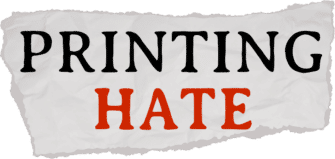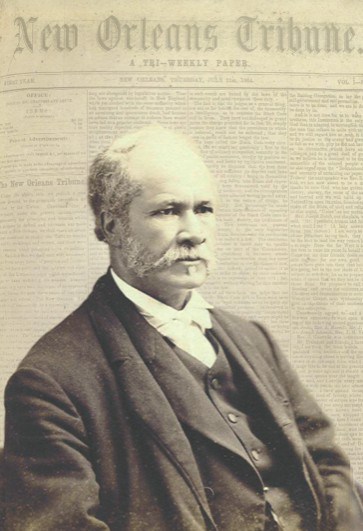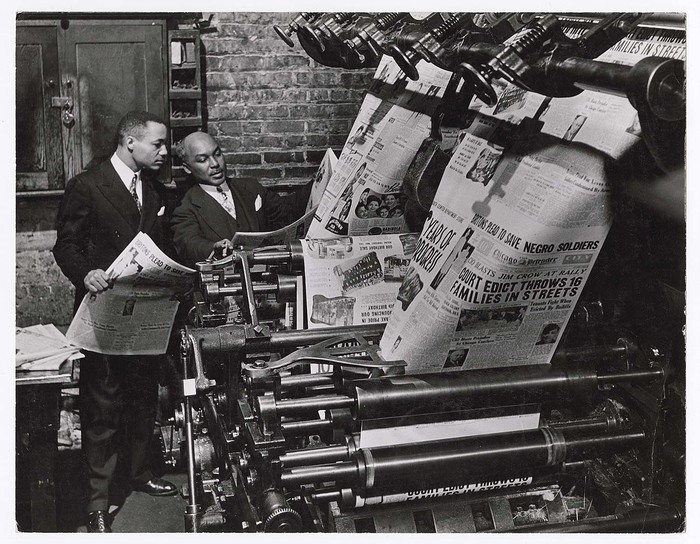 In this episode of the podcast Seizing Freedom, host Kidada E. Williams speaks with Adam Serwer, staff writer at The Atlantic. They speak about:
In this episode of the podcast Seizing Freedom, host Kidada E. Williams speaks with Adam Serwer, staff writer at The Atlantic. They speak about:
. . . the role of the Black press in the United States. They look at how conspiracy theories, misinformation and slander have been used as a form of media propaganda since the formation of the Ku Klux Klan, and how pioneering journalists like Ida B. Wells-Barnett laid the groundwork for identifying and calling out these campaigns.
Additionally, they discuss the evolution of legacy media outlets over time to include more diverse voices, and what it means to tell the truth objectively when reporting on American history as a Black journalist.
We recommend this episode because too often the Black press is left out of U.S. history lessons — both the role it played in challenging white supremacy and as a key source of historic information and analysis.
Interview Excerpts
Here are some excerpts from the Seizing Freedom interview with Serwer. The full transcript for each episode can be found on the Seizing Freedom website.
Conspiracies and Lies
There were whole newspapers that said the Klan did not exist. You had people who were victims of the Klan who were literally testifying in Congress about seeing people be murdered or being attacked or mutilated themselves. And you would have these Democratic-aligned papers and some Republican papers as well saying, ‘Oh, you know, the Ku Klux Klan is like a fictional invention of fevered imaginations.’
But it was completely made up, and Black newspapers were saying, ‘This is nonsense; it’s made up.’ These papers were often responding to essentially lies that were put forth in democratic-aligned, white supremacist papers. You know, so that part of it isn’t new, and the other thing that isn’t new is Black writers serving as a corrective against that type of misinformation and slander.
Ida B. Wells
There was a campaign of terrorist murder that was occurring during her lifetime, and she was one of the people who was primarily responsible for not only countering that propaganda that was justifying that campaign of terrorism, but for laying down a historical record that historians would use to show that it was, in fact, a propaganda campaign; that this was political terrorism and, you know, not simply what you might think of as mob violence.
And she was also subject to it. I mean, you could talk about cancel culture today, but Ida Wells literally had a newspaper called The Free Speech that was burned down because she said that Black men are being lynched for consensual relationships with white women. You know, I think sometimes people forget that, you know, white supremacy was the governing ideology of the United States for longer than the United States has existed without that ideology being its governing philosophy. And so, that being the governing ideology of the country, it is reflected in its media organs.
Learn More
Find more resources on the Black press below, including a digital archive for the Reconstruction era New Orleans Tribune, started by Charles Roudanez, the biography of Simeon Booker, and the documentary, Soldiers Without Swords. Also see Printing Hate, a digital story collection on the role of the white press. As the developers explain,
From the end of Reconstruction to 1940, newspapers were the most powerful news medium in America. Those run by white supremacist publishers and editors printed headlines and stories that fueled racial hate, inciting massacres and lynchings of Black citizens.
The Printing Hate reporters identified newspapers still in existence that published headlines, cartoons, stories and editorials that aided and abetted racial massacres and lynchings. Their body of work comprises more than 30 stories, including the role of the Black press in providing a counter-narrative.
We also recommend the first season of Seizing Freedom, “the show where we dig into archives to bring you stories about how African Americans freed themselves during the Civil War and built new lives during Reconstruction . . .” Host Kidada E. Williams is one the signers of the open letter to school districts included in the Zinn Education Project report, Erasing the Black Freedom Struggle: How State Standards Fail to Teach the Truth About Reconstruction.














Twitter
Google plus
LinkedIn